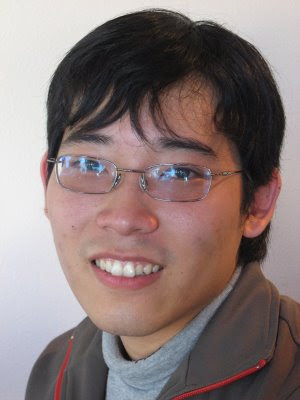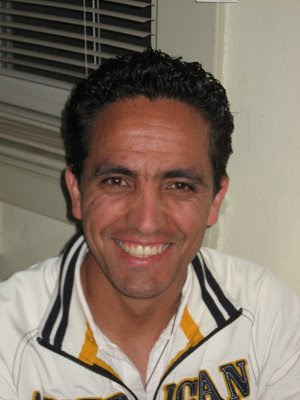
Portland, Oregon, that is. Home to our House of Welcome and Discernment/ Casa de Bienvenida y Discernimiento and of our postulancy program as well. This past week, we welcomed two students to our House of Welcome, and four member of our nine-month postulancy program. Both programs, which operate independently and in different sites, are intended to assist men in their discernment and preparation for Franciscan life.

First stop (photos above and immediately below), our postulancy house, the House of the Transfiguration. For more than 25 years, the friars of the St. Barbara Province have welcomed men to the beautiful city of Portland as their initial point of entry in Franciscan life. The program has operated in various locations over time. After nearly two decades in northeast Portland, the postulancy has moved across town to the parish of Our Lady of Sorrows to take up residence in the former convent.

Postulants (above, l to r ) Mike Minton (Oakland, California), Ryan Thornton (Monrovia, California), Jose-Antonio Merida (Oakland, California), and Phillip Polk (San Carlos, Arizona) have been in Portland for a week now and seem to be settling in well in their new digs. They are embarking on a nine-month period of residential discernment which will finish in June, 2009. At that point, should they decide to continue with their formation in Franciscan life, they will move on to the next stage-- novitiate-- at Old Mission San Miguel, California.

But wait a minute; I'm getting ahead of myself! This year, under the leadership of their director, Brother Robert Rodrigues, as well as assistant director, Fr. John de Paemelaere (better known as John D.), our new postulant brothers will be experiencing the daily horarium (routine) of Franciscan living: morning prayer and Eucharist, breakfast, work assignments out of the home, meal preparation and dinner, prayer, and evening classes. The work assignments take the form of part-time employment (up to 20 hours per week). Also, the men pay a nominal rent each month to help support the community. The classes take the form of various subject areas: Franciscan life and spirituality, Catholicism 101, human sexuality, communications, Catholic social teaching, the meaning of the vows, and the like. Weekends and discretionary free time are devoted to volunteer ministry.

Brother Robert and Father John De serve as guides and mentors during the year. In addition to the 'core curriculum' of the postulancy program, each man has his own program of personal development to pursue during the year. We recognize that each man is a unique individual, and our task is to assist him in his growth as a human being, as a Catholic Christian, and as one who is actively and seriously discerning a call to Franciscan life. To that end, each postulant will have his own personal spiritual director, with whom he will meet on a monthly basis. In addition, he may have a variety of personal activities to explore, including one on one counseling opportunities, 12-step recovery work (e.g., Al-Anon, Adult Children of Alcoholics), etc. Also, every man has a companion friar-- an older friar outside of his formation program who can assist and accompany him through his year.

Oh yeah, don't let me forget that being a Franciscan means you're allowed (and encouraged!) to have fun, too! Hence, the crowd on the steps of the House of Welcome, just a 15-minute drive from the postulancy community. The HOWD is a special program established to assist men of immigrant backgrounds who are in discernment with the community. The House of Welcome is especially geared to assist men in the acquisition of English language skills and in their acculturation to life in the United States.
Brother Balbino (Freddy) Rodriguez, himself a native of El Salvador, is director of the program, and is assisted by Fr. Larry Gosselin, in residence. Under Brother Freddy's direction, men are invited to live at the House of Welcome while studying English on a full-time basis. Depending upon their preparation and ability, men may study at a local community college and/ or nearby Mount Angel Seminary, operated by the Benedictine Order. Room and board, tuition costs, and transportation are underwritten by scholarships from the Province of St. Barbara. In accordance with United States immigration law, we can accept only candidates with appropriate documentation to this program. Residence can vary from 1-3 years, depending upon the needs of the candidate. Upon successful completion of the program, men may advance to postulancy. To date, we have had a number of successful candidates who have passed through the House of Welcome. This year we welcome Juan-Jose Juarequi of Zacatecas, Mexico, and Oakland, Calfornia. We also welcome Sung Wook (Zeno) Im from Seoul, Korea, and Glendale, California.

Back to the 'fun' part. On the day these photos were taken (Thursday, September 6), both the postulants and the students from the House of Welcome gathered for an an afternoon outing. After demolishing three extra-large pizzas at Portland's celebrated Flying Pie Pizza Company, we headed on across town to the hillside Japanese Garden.


So, here is the Zen garden-- as viewed by our House of Welcome brother, Zeno (Sung Wook) Im. Hence, Zen and Zeno meet.

... along with Zeno's classmate, Juan-Jose Juaregui...

... AND Father Larry...

... AND Brother Freddy, with Tito the sweet and gentle, shoe and sandal eating monster mascot of the House of Welcome!

Let's keep all of our new brothers in prayer as they embark on this important, grace-filled time in their lives and in the life of our community. Each brings such wonderful gifts to share with us and with God's people. Welcome, Brothers!








